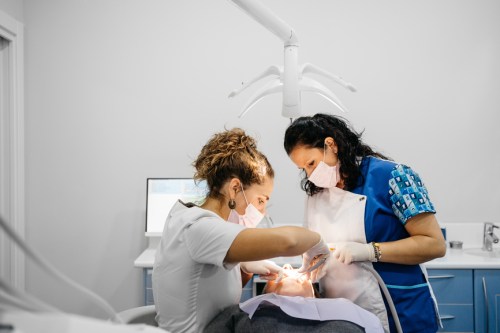You Might Want To Postpone Your Dentist Appointment—Here’s Why
Experts and patients weigh in on the risks and benefits of visiting the dentist for routine care during the COVID-19 pandemic.

Going to the dentist has never been what we’d call a good time, but, amid the COVID-19 pandemic, it’s a more loaded endeavor than ever. After all, there’s no way to mask up while getting your teeth cleaned, which means you’re more vulnerable to potential coronavirus exposure than you might be in other health care scenarios. As a result, you may be questioning whether or not to make that appointment.
Experts in This Article
professor of medicine and epidemiology at UCLA
On August 3, the World Health Organization (WHO) supported that impulse to postpone dentist check-ups. In response to COVID-19 transmission rate increases, the United Nations agency released new guidance regarding oral health care, recommending that routine dental care—check-ups, cleaning, and other preventative services—be avoided. Essential visits like oral emergencies should continue to be scheduled.
The reasoning behind this type of caution, explains Timothy Brewer, MD, professor of medicine and epidemiology at UCLA, is that dentists, hygienists, and patients are at a high risk for transmitting the virus because it’s shed in respiratory secretions and saliva. “Dentists and dental hygienists are involved in aerosol-generating procedures with their probes and drills and buffers and things like that, and they’re in very close contact for prolonged periods of time indoors,” he says. “All of that increases risk of transmission.”
The American Dental Association, however, responded to the WHO’s guidelines by saying they “respectfully yet strongly disagree” with the recommendation to delay care. Instead, the organization insists that preventative dental care, like cleanings, is critical to maintaining overall wellbeing. “Dentistry is essential health care because of its role in evaluating, diagnosing, preventing or treating oral diseases, which can affect systemic health,” says ADA president Chad P. Gehani.
With no end to the pandemic in sight, many dentists agree that it’s imperative to keep those routine appointments. “The reality it was don’t know when this pandemic will end… so to hold off any preventative treatment would be counter to what we should be doing,” says Lawrence Fung, DDS, a dentist in Los Angeles. If anything, he says, patients should be prioritizing preventative treatment; after all, the healthier you are, the better equipped you are to conquer COVID-19.
Mori Aletomeh, DDS, agrees that it can ultimately be dangerous to delay routine treatment, even for kids. “Leaving decay or cavities to wait a year is not wise,” the Torrance, California-based pediatric dentist says. “Those cavities progress so much faster in baby teeth. This can cause abscess and cellulitis that then the kid needs to go into a hospital setting and get IV antibiotics.”
If you do decide to go to the dentist, many practices are taking extra precautions to keep patients and the professionals safe. While Dr. Fung’s practice always utilized HEPA air filters, took digital payments, and worked with dental dams/Isolites (devices that constantly suction inside the mouth to keep aerosols from entering the atmosphere), they now also require temperature checks, N95 masks for practitioners, and COVID-19 prescreening forms. They’ve stopped polishing teeth during cleanings to reduce spatter, too. Dr. Aletomeh is taking similar precautions at her practice, noting that they’ve reduced patient load, limited parental chaperones to one per family, required fees to be paid by phone, removed toys, switched to N95 masks, and added HEPA filters.
Ultimately, the decision as to whether or not to see a dentist right now is an individual one. “Everything is a risk-benefit ratio,” says Dr. Brewer. “For someone who has excellent oral hygiene, maybe postponing routine cleanings for a year is not a particularly big deal. But for those who have underlying gum disease or other issues, it is perhaps higher risk to delay those routine services.” If you feel you’re in the latter category but are worried about vulnerable family members at home, or just feel anxious about exposure, Dr. Aletomeh recommends booking the first appointment of the day to lower your risk.
And while some of us would use any excuse to skip the dentist—and a permission slip from WHO is a pretty epic out—we should remember that oral care is important. Because postponing could be a dangerously indefinite solution, talk to your provider about your concerns and find out the precautions they’re taking to reduce the risk of exposure.
Sign Up for Our Daily Newsletter
Get all the latest in wellness, trends, food, fitness, beauty, and more delivered right to your inbox.
Got it, you've been added to our email list.










